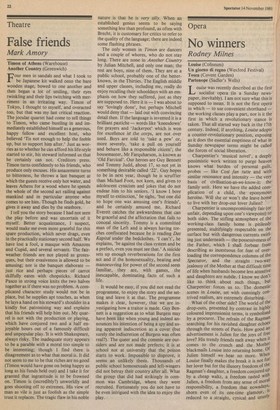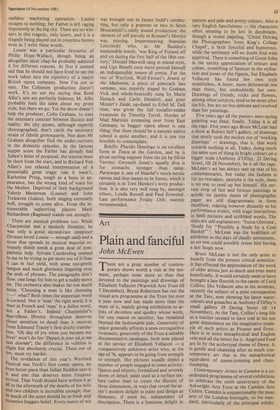Opera
No winners
Rodney Milnes
Louise (Coliseum) Un giorno di regno (Wexford Festival) Tosea (Covent Garden) Partenope (Sadler's Wells) I ouise was recently described as the first socialist opera (in a Sunday newspaper, inevitably). I am not sure what this is supposed to mean. It is not the first opera in which — to use convenient shorthand — the working classes play a part, nor is it the first in which a revolutionary stance is taken. That all started way back in the 17th century. Indeed, if anything, Louise adopts a counter-revolutionary position, exposing as it does the essential emptiness of what in Sunday newspaper terms might be called the forces of social liberation.
Charpentier's 'musical novel', a deeply pessimistic work written to purge heaven knows what burden of personal guilt, probes — like Cosi fan tutte and with similar resonance and intensity — the very basis of civilisation-as-we-know-it: the family unit. Here we have the added complication of a child, the eponymous heroine. Will she or won't she leave home to live with her drop-out lover Julien?
Charpentier is uncompromisingly fair (or unfair, depending upon one's viewpoint) to both sides. The stifling atmosphere of the working-class family home is pitilessly presented, stultifyingly respectable on the surface but with dangerous currents swirling just underneath — the possessiveness of the Father, which I shall forbear from describing as incestuous for fear of overloading the correspondence columns of the Spectator, and the straight two-way jealousy of the Mother at that difficult time of life when husbands become less attentive and daughters are nubile. I know we don't like to think about such things, but Charpentier forces us to. The domestic scenes in Louise, set with cunningly contrived realism, are extremely disturbing. What of the other side? The world of the drop-outs, presented by contrast in highlY coloured impressionist terms, is symbolised by a procurer. The refrain of the Ragman searching for his ravished daughter echoes through the streets of Paris. How good. a° advertisement is Julien for the joys of tree love? His trendy friends melt away when it comes to the crunch and the Mother,. blackmails Louise into returning home. 01 Julien himself we hear no more. When Louise finally makes the break it is not for her lover but for the illusory freedom of the Ragman's daughter, a freedom conjured LIP by a cheap waltz, a freedom tasted with. Julien, a freedom from any sense of moral responsibility, a freedom that nowadaYs: shorn even of its one-time glamour, Is reduced to a straight, cynical and utterly ruthless marketing operation. Louise escapes to nothing; her Father is left raging impotently at the big city. There are no winners in this tragedy, only losers, and it is a tragedy being played out in countless homes even as I write these words.
Louise was a particular favourite of Philip Hope-Wallace, though being an altogether nicer chap he probably admired it for different reasons. At first it seemed sad that he should not have lived to see the work taken into the repertory of a major British opera company. Now I'm not so sure. The Coliseum production doesn't work. It's no use my saying that Rene Allio's sets are perfectly hideous; M. Allio probably feels the same about my prose style, but there we go. Yet the decor doesn't help the producer, Colin Graham, to state the necessary contrast between illusion and reality: the city scenes, although expertly choreographed, don't catch the necessary strain of febrile grotesquerie. Nor does Mr Graham altogether find the under-currents in the domestic episodes. In the famous supper scene the Father has already had Julien's letter of proposal: the tension must be there from the start, and in Richard Van Allan's too relaxed interpretation of a potentially great tragic role it wasn't. Katherine Pring, tough as a bone in appearance, has the wrong kind of voice for the Mother. Deprived of their background Valerie Masterson (Louise) and John Treleaven (Julien), both singing extremely well, struggle to come alive. From the innumerable supporting players Mark Richardson (Ragman) stands out strongly.
There are musical problems too. While Charpentier was a masterly librettist, he was only a good second-rate composer (Strauss loved Louise — enough said) and a score that spreads its musical material extremely thinly needs a great deal of sympathetic help. Sy!vain Cambreling seemed to me to be trying to get more out of it than it can in fact yield, with some too-gentle tempos and much glutinous lingering over the ends of phrases. The paragraphs don't flow: one longs for him to get a ruddy move O. The orchestra also makes far too much noise. 'Choosing a man is like choosing ' what? Both times the important word is covered. Nor is 'man' the right word; it is 'Hari in French and 'man' is a Julien word, not a Father's. Indeed Charpentier's marvellous libretto throughout deserves Closer attention to detail than it receives from Edmund Tracey's first-drafty translation. 'Oh day of joy when you became my lover' won't do for `Depuis le jour oti je me suis donnee% the difference in volition is Slight but absolutely crucial. Three out of ten, must try harder.
The revelation of this year's Wexford Festival was Verdi's first comic opera, an yen better piece than Julian Budden says it S and one that deserves more frequent evival. That Verdi should have written it at 11 in the aftermath of the deaths of his wife nd two children is incredible enough; that much of the score should be so fresh and nventive beggars belief. Every ounce of wit was brought out in James Judd's conducting, but only a gramme or two in Sesto Bruscantini's oddly muted production: the element of self-parody in Romani's libretto was missing. Impersonating Stanislas Lesczinski who, in Mr Budden's memorable words, 'was King of Poland off and on during the first half of the 18th century,' Donald Maxwell sang in sound style, and Ugo Benelli once more proved himself an indispensible tenore di grazia. For the rest of Wexford, Wolf-Ferrari's Jewels of the Madonna, a piece of gimcrack late verismo, was expertly staged by Graham Vick and whole-heartedly sung by Marie Slorach and Carlo Desideri; and poor Mozart's Zaide, up-dated to Ethel M. Dell time, was given the full socialist-realist treatment by Timothy Tyrrel. Hordes of Mad Marxists streaming over from East Germany to bugger opera about is one thing; that there should be a nascent native school is quite another, and it is one too horrible to contemplate.
Briefly: Placido Domingo is on excellent form in Tosca at the Garden, and he is given sterling support from the pit by Silvio Varviso. Gwyneth Jones's squally diva is for stomachs stronger than mine. Partenope is one of Handel's mock-heroic operas and thus meant to be funny, which it certainly is in Tom Hawkes's witty production. It is also very well sung by, amongst others, Lynda Russell and Paul Esswood. Last performance Friday 13th; warmly recommended.



































 Previous page
Previous page